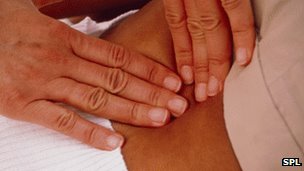The thyroid hormones regulate the body’s metabolic rate and promote growth and development throughout the body, including the brain. If there isn’t enough thyroid hormone circulating in the blood, the brain (via the pituitary gland) sends a chemical message (thyroid stimulating hormone) to the thyroid gland, which then releases a measured dose of these hormones.
The two main thyroid hormones, thyroxine and triiodothyronine, are synthesised from the amino acid tyrosine in combination with iodide. Thyroxine (T4) contains four iodine atoms and triiodothyronine (T3) contains three. If a person’s diet is too low in iodine, the thyroid gland gets larger and larger in an attempt to make more thyroid hormone. This overgrowth of the thyroid gland is called goitre.
The recommended daily intake (RDI) for iodine depends on your age and life stage. The amount we need is very small (around one teaspoonful over a lifetime for most adults) when compared to other nutrients and is measured in micrograms (mcg, or µg):
Younger children (1 to 8 years) – 90µg
Older children (9 to 13 years, boys and girls) – 120µg
Adolescents (14 to 18 years) – 150µg
Men – 150µg
Women – 150µg
Pregnancy and breastfeeding – 220µg and 270µg respectively.
If you don’t get enough iodine in your diet, you may need to consider taking a supplement. For most people, an additional 50µg per day would be ample.
How to get enough iodine in your diet
The best way to get the nutrients your body needs is as part of a healthy, well-balanced diet. Some suggestions to make sure you get the required daily amount of iodine include:
Seafood – dietitians recommend two to three meals of seafood per week to get the beneficial fish oils. Eating fish twice a week will also provide most adults with enough iodine to fulfil their average iodine requirement.
Bread – is now made using iodised salt in Australia. Organic breads and ‘no added salt’ breads are the only exceptions to this rule.
Seaweed (kelp), dairy products and eggs – provide additional dietary sources of iodine.
Some vegetables – may contain iodine, but only if they are grown in iodine-rich soils.
Supplements – may be necessary if your dietary intake is inadequate. Many multivitamin capsules and tablets supply 100–150µg of iodine.











::::Your Comments are Valuable for Us-Post your queries below::::.